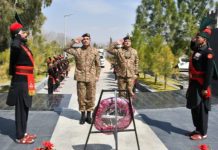Written by ZubedaAnjumNiazi
As nation states and empires grow, the possibility of war and friction between two states also increases. A close scrutiny of history makes it obvious that war between states has been a perpetually widespread phenomenon. Nations go to war because of historical enmity and antagonism, resources and territorial conflicts as well as in self-defense against an aggressor. Indubitably war shapes the strategic culture of a nation and plays an important role in defining the future course. The South Asian region is dominated by the aggressive designs and war mongering predilections of India as is evident by the Indian hostilities in Kashmir. India and Pakistan, the arch rivals and key players of the region, share a history of many wars, conflicts and stand-offs.
A history of persistent border altercations and conflict over Kashmir fulminated in the form of an all-out war between Pakistan and India in 1965. Although, the conflict began with Pakistan’s Operation Gibraltar, it all snowballed when India launched an offensive on Pakistan by crossing the international borders without a formal declaration of war. Consequently, the whole nation formed a cohesive unit with the brave soldiers to defeat the Indian Army. The military and the people of Pakistan stood united in the face of India’s belligerence for the defense of the country, ergo the 6th of September is a golden chapter in the history of Pakistan and is celebrated to honor and pay a tribute to the Armed Forces and martyrs of the war.
Pakistan observes the Defense day on the 6th of September every year to commemorate the day when its armed forces successfully rebuffed the offensive launched by the Indian forces in the 1965 war. A series of events and military parades are organized on this day with the aim to remember the heroes. The 1965 war featured one of the largest engagement of battle tanks ever since the World War II and lasted seventeen days causing many casualties, nevertheless the Pakistani nation defended its state with their inherent resilience. Hostilities between the two rivals ended with a ceasefire declared because of international intervention and the subsequent Tashkent Declaration. The war is an epic example where the tri-forces of Pakistan defended their state with courage and valor, forcing the enemy to retreat. The operational preparedness and battle readiness of the country successfully deflected India’s aggression and unleashed the potential of the Pakistani Armed Forces.
The war of Ran of Kutch in the Spring of 1965, Operation Grand Slam and Operation Gibraltar led to the culmination of the 1965 war which was fought on three fronts necessitating the complete involvement of Pakistan Navy, Army and Air force. The 1965 Indo-Pak war is an extraordinary illustration of an integrated land and air battle. Pakistan Air Force proved its might by swiftly retaliating and providing support to Pakistan Army in the Chamb sector. Pakistan Air Force’s air strike on the Pathankot’sIndian Air Force base has been classified as the most successful air raids of the contemporary history by the historians and defense analysts of both sides. It is lauded by experts as a surprise as well as a precise air raid that produced the desired results and destroyed many Indian aircrafts on the ground along with damaging the Air Traffic Control building. Nevertheless, following the momentous hit on Pathankot, Indian MiG-21s were not seen in the air for the remaining span of the 1965 War.
Pakistan Army had both a numerical advantage in tanks, as well as better equipment overall when compared to the Indian Army’s. The tank battles fought between the area of Chawindaand Charwa and during the Lahore Offensive, were the most influential land battles of the war. Initially, though the Indians were close to victory but in the last stages Pakistan Army wrestled the victory from its rival by practicing optimum level of professionalism. The Chawinda Battle is an accomplishment of Pakistan Army that exemplifies the effectiveness and fervor of the military to defend its homeland. Besides Pakistan Army and Air Force, Pakistan Navy also played an indispensible role in defeating the foe by becoming a nightmare on the naval front. Operation Dwarka marked the first use of Pakistan Navy in the war, including destruction of Indian Radar system, is an explicit example of Pakistan naval personnel’s professional dedication and commitment involved. PNS Ghazi, the only submarine in the conflict theatre was deployed to stake out the Bombay harbor and attack heavy ships of the Indian Navy. PNS Ghazi’s blockade proved effective and besieged the Indian fleet including its only aircraft carrier Vikrant, which facilitated the Pakistani fleet to carry out Operation Dwarka without a glitch.The psychological fear of Ghazi cramped their operational maneuvers and did not effectively mobilized their surface ships at sea.
Having transcendence in operational preparedness, Pakistan navy is no less at meeting the regional and international maritime security obligations. Post 9/11 maritime security operations were being conducted in Arabian Sea and Indian Ocean Region, Pakistan Navy being part of Coalition Maritime Campaign Plan under UN mandate, has actively participated in maritime security and counter-piracy operations. Though a small naval force, Pakistan Navy’s share has remained highest at maritime security campaign after United States. Enhancing these initiatives further, Pakistan Navy instituted Regional Maritime Security Patrols (RMSP), an initiative to continue support to uphold international efforts in the region. The main purpose to establish RSMP, is to ensure maritime security at sea for protection of domestic and international trade. Thus, contribution at large is the manifest projection of Pakistan as a state shouldering regional and international maritime commitments.Pakistan Navy has always exhibited audacity whenever it comes to defending its sea borders. Despite of being numerically less, has remained fully capable of thwarting any aggressive move by the Indian Navy, as exemplified in 1965 war.
To conclude, Pakistani Armed forces successfully deflected the attack launched by India along with protecting the lives of thousands of civilians and their homes. Defense day is a day to vow that Pakistani nation will not be intimidated by any enemy and will always stand by and support its Armed Forces by honoring the martyrs who sacrificed their lives and acknowledging the courage, fighting spirit and tactical expertise of the Armed forces.
ZubedaAnjumNiazi can be contacted at [email protected]











